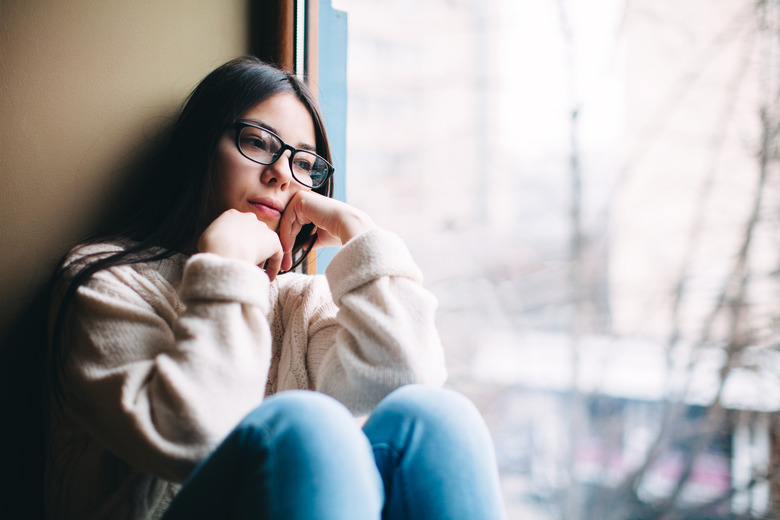Here's Why You Tend To Feel Gloomy In The Winter
We'll be honest: Waking up for school in the morning isn't always the first thing anyone wants to do, and we all crave a lazy day in bed every now and then. But if your mornings have felt more torturous lately – and you're also feeling drained and negative – well, it could be SAD.
What's SAD, you ask? It stands for Seasonal affective disorder. It's a form of depression that usually gets activated in the colder months, when the days are shorter (so you get less sunlight) and the weather, well, kinda sucks.
Seasonal affective disorder is surprisingly common. It can impact adults, teens and children, and affects about 6 percent of the population. But those numbers are higher the farther north you get – the rate of SAD is in New Hampshire, for instance, is seven times higher than in Florida.
So how can you tell if you might have SAD – and what causes it, anyway? Read on to find out.
How the Weather Impacts Your Brain
How the Weather Impacts Your Brain
If you've ever felt a little drained after a week of rainy weather, only to feel your energy come back on the first sunny day, you know firsthand that your surroundings can impact your mood. There are a few reasons weather affects how you feel (after all, it's just no fun spending time outside if it's pouring!) but one reason is that exposure to sunlight triggers chemical changes in your brain.
Specifically, sunlight leads to the release of feel-good hormones, like serotonin, that act as natural mood boosters. On top of making you feel happier, serotonin also helps you feel more focused and alert, so you're able to get more done throughout the day.
If you don't get enough sunlight – like in the dead of winter, where you're probably stuck indoors for most of the sunlight hours – your serotonin levels can start to dip. With less of the feel-good hormone available, you can start to feel gloomy. And you're also likely to feel tired and unfocused, since there's isn't as much serotonin available to perk you up.
What are the Signs of Seasonal Affective Disorder?
What are the Signs of Seasonal Affective Disorder?
You've probably already picked out a few of the biggest ones: feeling less positive than usual, feeling sad when you're not exactly sure why, and wanting to sleep more than usual – or feeling tired even when you did get a good night's sleep.
But there are other signs, too. You might notice you're losing interest in activities you once enjoyed, which could include extracurriculars, or just spending time hanging out with your friends. And you might notice changes in your appetite. It's more common to feel hungrier than usual – which might mean you gain weight – but you could also lose your appetite and end up eating less often.
In more severe cases, SAD can be life-threatening. You might find yourself thinking of self-harm or suicide, even if you've never thought about them before.
Here's What to Do If That Sounds Like You
Here's What to Do If That Sounds Like You
While SAD is serious, it's also extremely treatable. So chat with your parents or another trusted adult if you've been struggling and you think SAD might be the reason. You don't need to sit down for a heart-to-heart (unless you want to!) – just let your parents know you'd like to book an appointment with your family doc to discuss how you've been feeling.
From there, your doctor can rule out other causes (because lots of health conditions can cause SAD-like symptoms) then lay out the best course of action. Treatment could be as simple as light therapy – essentially, using a sun lamp to emulate the benefits of getting actual sunlight – or could include meds or talk therapy.
If you don't feel comfortable chatting with any of the adults in your life, consider reaching out anonymously. Phone lines like Teen Line and the U.S. Department of Health & Human Service's National Hotline allow you to open up without ever having to give your name, and can lay out the next steps to help you feel better.
Cite This Article
MLA
Tremblay, Sylvie. "Here's Why You Tend To Feel Gloomy In The Winter" sciencing.com, https://www.sciencing.com/heres-why-you-tend-to-feel-gloomy-in-the-winter-13716802/. 23 January 2019.
APA
Tremblay, Sylvie. (2019, January 23). Here's Why You Tend To Feel Gloomy In The Winter. sciencing.com. Retrieved from https://www.sciencing.com/heres-why-you-tend-to-feel-gloomy-in-the-winter-13716802/
Chicago
Tremblay, Sylvie. Here's Why You Tend To Feel Gloomy In The Winter last modified March 24, 2022. https://www.sciencing.com/heres-why-you-tend-to-feel-gloomy-in-the-winter-13716802/
